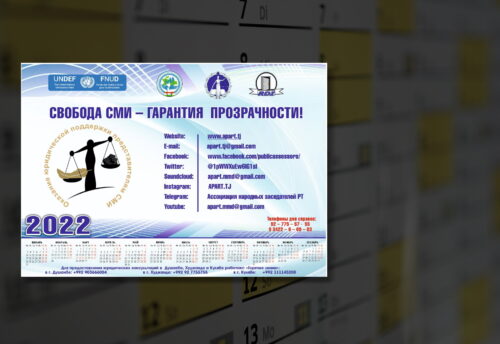(Gilbert Chesterton, English journalist and writer)
Journalists often turn to us with questions related to the violation of their rights in their professional activities, but there are also moments when not all journalists are aware of their rights and obligations prescribed by law. With the advent of the Covid-19 virus, many journalists cannot obtain reliable information in order to fulfill their obligations to society, to inform residents of socially important information. There were cases when the media were accused of unprofessionalism and violation of ethical standards. Not because journalists did not know their rights, but most likely because those who possessed information did not know what to search for, obtain, process and disseminate information – these are the basic rights and obligations of journalists and they are guaranteed by the Constitution of the Republic of Tajikistan.
In our time, it is necessary that the media often remind that the activity of a journalist is based on the principle of legality to seek, obtain, prepare and distribute, and at the same time not cross the line that concerns the institution of secrecy, honor and dignity, business reputation, private life, etc. .d. It is necessary that others know that, upon presentation of an official ID, a journalist has the right to visit public places, attend open court hearings, take photographs and videotape, interview officials and visit other state facilities, because the terms public in the civil code mean state, and if it is state-owned, then on the basis of the Constitution of the Republic of Tajikistan it is popular, and of course, if it is not prohibited by law.
The rights of journalists stem from Article 30 of the Constitution of the Republic of Tajikistan, which states: “Everyone is guaranteed freedom of speech, press, the right to use the media” and also the obligations that are spelled out in Article 42 of the Constitution of the Republic of Tajikistan “observe the Constitution and laws, respect the rights, freedoms, honor and the dignity of others.”
The media and journalists have sectoral laws that directly regulate media activities from establishment to liquidation. These are the Law of the Republic of Tajikistan “On periodicals and other media” and the Law of the Republic of Tajikistan “On television and radio broadcasting”. These laws clearly separate the rights and obligations of journalists.
The law of the Republic of Tajikistan on television and radio broadcasting is an outdated law that needs to be updated, because today’s television is switching to digital broadcasting and new players appear in this field, and their rights and obligations are not spelled out in the current law. Therefore, the media and journalists need to refer more to the Law of the Republic of Tajikistan on periodicals and other media, since this law was adopted in 2013 and the rights and obligations of journalists are more extensively spelled out in this current law.
For example;
Law of the Republic of Tajikistan “On periodicals and other media”.
Article 28. Rights of a journalist
The journalist has the right:
– search, extract, edit and publish information;
– in connection with the performance of journalistic duties, talk with officials;
– record any fact, including the use of audiovisual, technical means of cinema and photographic equipment, except in cases prohibited by law;
– upon presentation of a journalistic certificate, be present in specially protected areas of natural disasters, catastrophes, areas of unrest and crowded places, as well as in areas where a state of emergency has been declared, at rallies and demonstrations;
– when checking facts and events related to the materials received, contact specialists;
– refuse to write materials that contradict his convictions;
– publish information and prepared material under their own and (or) under a code name (pseudonym);
— through a journalistic application, have access to free information and to official documentation related to the performance of professional duties;
– do not subscribe to information, the meaning of which, in his opinion, was distorted by the editors of the mass media in the process of corrections;
– Preliminarily stipulate the preservation of copyright secrecy.
Article 29. Obligations of a journalist
The journalist must:
– comply with the charter of the activities of the editorial office of the mass media, with which he entered into labor relations and act on his instructions;
– check the accuracy of the information received;
– before publication, coordinate the material of the prepared interview with its primary source;
– satisfy the desire of persons who transmitted information about the expression of their author’s opinion, if this news is published for the first time;
– refuse to fulfill the instructions of the editor-in-chief (editor) or the editors of the mass media, provided that it (the instruction) contradicts the law;
– respect the rights and freedoms, the legitimate interests of a person and a citizen, the rights and legitimate interests of organizations;
– when fulfilling a professional obligation, to present a certificate and (or) other document confirming his attitude to the mass media.
– do not use the media to interfere with personal life, publish deliberately false information, information that offends, slanders, degrades the honor, dignity, reputation of individuals and legal entities.
Journalists may also enjoy other rights provided for by law (Article 28 p2). For example, a right such as:
— The right not to disclose the source of information (Article 27);
– use copyrighted work in compliance with copyright (Article 25, paragraph 1);
– after receiving accreditation, has the right to take part in meetings and other events of these state bodies and organizations, in accordance with the procedure established by the legislation of the Republic of Tajikistan, to get acquainted with the transcript, protocol and other documentation and, if necessary, copy them (Article 30, paragraph 2 ).
When exercising their rights, we also recommend that journalists when covering:
– always carry an official ID or other document from the editorial staff confirming that you are on duty;
– with the participation of journalists in crowded places, wear identification vests with the inscription “PRESS”, be dressed in comfortable clothes and shoes, also stick official cars with a sticker with the name of the media;
– due to the current situation with the Covid-19 virus, when covering the work of hospitals and other medical institutions, wear protective equipment (overalls, mask, glasses, etc.).
In the field of law, you may see wording such as “except as prohibited by law.” There are restrictions in the Law of the Republic of Tajikistan on periodicals and other media, where the media or journalists cannot go beyond these boundaries. This applies to general prohibitions such as:
– distribution of information containing state secrets or other information protected by law, information calling for the violent overthrow or change of the constitutional order, the commission of a criminal act, incitement of racial, national, local, religious, linguistic hatred, propaganda of war, violence, terrorist and extremist activities , causing harm to the integrity and independence of the state, as well as propaganda and advertising of materials and information of a pornographic nature (Article 6);
—distribute their products without specifying information about the mass media (Article 16, paragraph 2);
– to disclose information of the preliminary investigation without the written permission of the prosecutor, investigator or interrogating officer (Article 26, paragraph 2);
– in their information, submit for discussion the preliminary outcome of the trial in a specific case, the decision on which has not entered into force (Article 26, paragraph 3);
– without the consent of the minor and his legal representative to publish information relating to the disclosure of the identity of a minor offender (Article 26, paragraph 4).
Naturally, in case of non-compliance with the norms of laws, the media or the journalist will be held liable both to civil legal and administrative and up to criminal liability, depending on the category of violation of rights. But, the current situation has made the media and journalists of Tajikistan very cautious in terms of self-preservation. Every year, non-profit organizations provide media representatives with knowledge about ethical standards and legal norms in all areas of their activities.
In the next publication, we will try to prepare you information about the existing prohibitions that are spelled out in the regulatory legal acts for the media and journalists.
Be vigilant and careful! We wish you fruitful work.
Information taken from the website https://www.khoma.tj/khoma/ru/




Leave a Reply